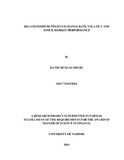| dc.description.abstract | In the year 2015 on the first two quarters there has been a poor performance in the Kenyan
stock market. Investors had shifted to their funds to the stock exchange in Nigeria. Various
reasons have been given to this changes. Major ones being introduction of the capital gains
tax and exchange rate fluctuation. The latter reason was mainly assumed due to a similar
fluctuation of the Kenya shilling against the dollar. This study thereby confirms if this
reason given by analysts is true and whether investors, borrowers, stock brokers and the
regulatory authority can use this study to predict the stock market performance.
Stock market performance is key in determining if an investor’s portfolio of stocks will
bring adequate return. This is looked at both in the long run and short run. Factors that
influence the performance of the stock market is therefore important to both the investor
and issuer. This research sought to determine the relationship between exchange rate
volatility and stock market performance in the Nairobi Securities Exchange. Three major
theories relating to the two variables are introduced to explain the relationship. Results of
different scholars who have conducted their studies in stock markets across the globe will
be presented in this research and an explanation of how they drive at their conclusion.
Descriptive research design was adopted for this study in which secondary data from the
Kenya National Bureau of Statistics and Key Leading Economic was gathered over the
period 2011- April 2015. The collected data was analyzed by use of Microsoft excel 2013
and statistical package for social sciences (SPSS) version 17. Regression and correlation
analysis were done to determine the effects of exchange rate volatility on the performance
of the stock a market. Other macro-economic factors i.e. Inflation volatility, Money supply
volatility and interest rate volatility were also included to determine the impact it had on
the performance in the stock market It was established that exchange rate volatility is
among the determinants of stock market performance though not very key | en_US |

